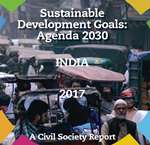Published on Mon, 2017-12-11 10:51
In India, PPPs are expected to mobilize about half of the US$ 1 trillion target for infrastructure investment by the end of the 2012-2017 Five Year Plan. The government has been actively promoting PPPs in many sectors of the economy and the report by Social Watch India presents a mixed picture. Many of the highway/road construction projects like Golden Quadrilateral and seaports like the Jawaharlal Nehru Port Trust (JNPT) have been deemed a success. The report observes, however, that “many times PPPs are good in theory, but in practice… they have transmogrified into avenues for the realtors to become rich at the cost of the tax payers”. Some promoters who excelled at gold-plating projects 'persuaded' public sector banks to lend on questionable assumptions and collateral. These promoters took out their equity money in the construction phase and exited the project under various conditions. Given India's rank in 'enforcing contracts' of 178 out of 189 countries, this should cause little surprise, since PPPs are essentially contracts. The biggest losers have been Indian citizens. Public sector banks now have a pile of stressed loans, which can now be remedied only by recapitalization from the tax payer. |
Published on Fri, 2017-12-08 17:20
The international workshop 'Strengthening Public Policies for the 2030 Agenda and the Launch of the Spotlight Report 2017: Reclaiming Policies for the Public' was held in Beirut, Lebanon. This session looked into the role of different actors in the implementation of the 2030 Agenda: states, private sector and civil society. The panel discussion particularly discussed the roles for Civil Society Organizations (CSOs) in localizing the Sustainable Development Goals in regional and national contexts. Among the issues that were discussed is how CSOs can bring the voice of the poorest and most marginalized citizens to the national, regional and international fora. In addition, the session touched upon the CSOs contributions to implementation, including as service delivery agents and the accountability of CSOs and their role in making the other actors accountable. |
Published on Tue, 2017-11-28 16:13
“Data is the new Gold” headlined a 2014 article in the business press on the marketing power it offers. “Each click, like, and share creates new data in the world, much of which can be used to deliver relevant marketing information and bring increased value to consumer audiences.” Picking up on the potential of so-called Big Data to measure national and global progress on development goals agreed in the 2030 Agenda for Sustainable Development, the 2030 Agenda has driven a variety of new initiatives, bringing together a vast array of global corporations, foundations, and CSOs ready to mine this new seam. Three of these new data initiatives are the Global Partnership for Sustainable Development Data (GPSDD), Data 2X and the Digital Impact Alliance, all of which are housed at the United Nations Foundation (UNF) and which therefore claim only to advance UN goals and priorities, not the UN itself. Most of them are financed by a few major donors, public and private. |
Published on Mon, 2017-11-27 13:03
Achieving sustainable development in Lebanon requires addressing the root causes of Lebanon’s structural problems at political, economic and social levels and, additionally, to address the challenges presented by the huge influx of Syrian refugees in the country. The refugee crisis sheds light on the structural and systemic problems of Lebanon and aggravates them. In this context, the private sector, as in many other countries, must play an active role in achieving SDGs in Lebanon, along with other development actors. At the same time, they all should remain accountable for their contribution to sustainable development. |
Published on Fri, 2017-11-24 14:59
The first session of the Intergovernmental Group of Experts (IGE) on Financing for Development at the UN Conference on Trade and Development (UNCTAD) has focussed on the challenges faced by developing countries and international community with regard to mobilising domestic public resources, as well as on international development cooperation. |
SUSCRIBE TO OUR NEWSLETTER







